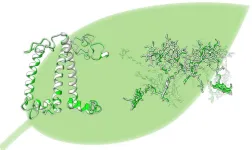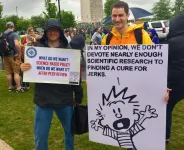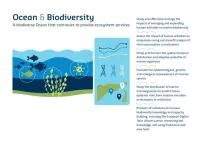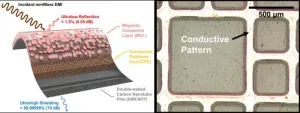(Press-News.org) It is well known that acting quickly in the event of a cardiac arrest is important, but what does a quick initial shock with a defibrillator mean exactly for patients' chances of survival? Researchers from Amsterdam UMC analysed the data of 3723 patients who had a cardiac arrest outside the hospital and concluded that for the first shock, every minute reduces the chance of survival by 6%. The results of this research were published today in the international journal Circulation.
"Our research shows that every minute of delay in giving the first shock has a major impact. If the first shock was given within six minutes, it was possible in 93% of the cases to stop the heart rhythm disorder ventricular fibrillation (VF) - which causes the cardiac arrest. If the initial shock was delayed and was only given after more than 16 minutes, for example, this percentage dropped to 75%," says Remy Stieglis, researcher at Amsterdam UMC. The study shows that every minute of delay to the initial shock leads to a 6% lower chance of survival until hospital discharge.
Since 2005, the ARREST study (Amsterdam REsuscitation STudies) has been collecting detailed data on resuscitation in North Holland in collaboration with emergency services and hospitals. For this specific study, data was gathered from those who had suffered a cardiac arrest, caused by VF, in the presence of a witness. This allowed the time from the emergency call to the first shock to be determined very accurately and, thus, the impact from the time to the first shock to be analysed.
"After a successful shock (defibrillation), VF is terminated and changes to a normal heart rhythm or a completely absent heart rhythm (asystole). In our study, a shorter delay to the first shock also led more often to a normal heart rhythm of your own. After a successful shock, VF may reoccur, requiring another shock. The chance of this also decreased with a shorter time to first shock," says Christian van der Werf, cardiologist and researcher at Amsterdam UMC.
By investing in the entire chain with the aim of shortening the duration from the emergency call to the first shock, outcomes after cardiac arrests can be improved. "In the Netherlands, a lot of work is being done to achieve a quick initial shock through the deployment of first responders (e.g. first responders via HeartbeatNu, police and/or fire brigade) and many available AEDs, but in 3 out of 4 resuscitations in our study, we did not reach those six minutes. More central control with concrete actions and further research is needed to achieve this goal in all resuscitations. More attention should also be paid to this abroad in order to keep the time until the first shock as short as possible. Our data shows that it pays off," says Hans van Schuppen, anaesthesiologist and leader of the ARREST resuscitation study.
END
Amsterdam UMC study proves impact of rapid first shock after cardiac arrest
For every minute of delay the chance of surviving a heart attack declines by 6%
2024-10-28
ELSE PRESS RELEASES FROM THIS DATE:
Children’s BMI can affect their future lung function
2024-10-28
An abnormal BMI in children – be it high or low – can now be associated with impaired lung function, but if their BMI is normalised before they reach adulthood, the impairment can be offset, researchers from Karolinska Institutet report. Their results, which are based on data collected under the BAMSE project in Sweden, are presented in The European Respiratory Journal.
One in ten people have reduced lung function development in childhood and cannot achieve maximal lung capacity in adulthood, increasing the risk of serious health problems such as cardiovascular disease, lung disease and diabetes. One risk factor associated with impaired lung function development is abnormal ...
Don't worry. Study shows you're likely a more creative writer than ChatGPT. For now
2024-10-28
Imagine you decide to write a short story about a protagonist who creates an artificial human and then falls in love with it. What gender is your protagonist? What about the artificial human? Would you write a moving love story? A cautionary dystopian tale?
Would your story be more compelling than one written by ChatGPT?
Likely yes, says Nina Beguš, a researcher and lecturer in UC Berkeley's School of Information and Department of History. Leveraging her background in comparative literature ...
Heart failure mortality declining in Sweden
2024-10-28
A new study from Karolinska Institutet shows that heart failure mortality has decreased in Sweden over the last 20 years. The study has been published in the European Journal of Heart Failure.
A national study has shown that heart failure mortality has decreased in Sweden over the last two decades. Despite these improvements, the prognosis for heart failure patients remains worrying – 25 percent of those diagnosed in 2022 died within a year.
“Our results suggest that advances in heart failure treatment over the past decades have reduced heart failure mortality, both at the population level and for individual patients. ...
Understanding how mutations affect diseases
2024-10-28
Many statistical models and algorithms used by scientists can be imagined as a “black box.” These models are powerful tools that give accurate predictions, but their internal workings are not easily interpretable or understood. In an era dominated by deep learning, where an ever-increasing amount of data can be processed, Natália Ružičková, a physicist and PhD student at the Institute of Science and Technology Austria (ISTA), chose to take a step back. At least in the context of genomic ...
Quality control in artificial photosynthesis: validating natural antenna mimicry
2024-10-28
Humans can do plenty, but plants have an ability we don’t: they make energy straight from sunlight, a superpower called photosynthesis. Yet new research shows that scientists are closing that gap.
Osaka Metropolitan University researchers have revealed the 3D structure of an artificial photosynthetic antenna protein complex, known as light-harvesting complex II (LHCII), and demonstrated that the artificial LHCII closely mirrors its natural counterpart. This discovery marks a significant step forward in understanding how plants harvest and manage solar energy, paving the way for future innovations in artificial ...
When science speaks in extremes
2024-10-28
“Vaccines are 100% safe, and anyone who doubts this is ignorant”: Have you ever come across messages like this during the pandemic crisis a few years ago? If you often feel that certain public debates—such as those on vaccines or the climate crisis—boil down to a black-and-white clash between two sides demanding, with harsh tones, unquestioning allegiance to their view, you're not entirely wrong. We are rightly accustomed to being warned about pseudoscientific misinformation and fake news, and much research has been devoted ...
Will the ocean suffer an epidemic?
2024-10-28
Written by a team of European experts from the marine sciences, Navigating the Future VI discusses how the biodiversity crisis is being played out in the Ocean. It notes that Ocean species large and small are far less well described than their terrestrial counterparts, making it harder to measure declines and their impacts. This publication provides governments, policymakers and funders with robust, independent scientific advice on future seas and Ocean research. With the COP16 on biodiversity already in full swing in Cali, Colombia, it is timely to reflect further on the need to better understand our Ocean biodiversity.
“Climate change ...
A single thin film perfectly absorbs all electromagnetic waves!
2024-10-28
The research team of Dr. Byeongjin Park and Dr. Sang Bok Lee from the Composites & Convergence Materials Research Division at the Korea Institute of Materials Science (KIMS), has developed the world's first ultra-thin film composite material capable of absorbing over 99% of electromagnetic waves from various frequency bands (such as 5G/6G, WiFi, and autonomous driving radar) using a single material.
This electromagnetic wave absorption and shielding material is less than 0.5mm thick and is distinguished by its low reflectance ...
Teens who made history with Pythagoras’ theorem discovery publish their first academic paper with new proofs
2024-10-28
In 2022, U.S. high school students Calcea Johnson and Ne'Kiya Jackson astonished teachers when they discovered a new way to prove Pythagoras’ theorem using trigonometry after entering a competition at their local high school. As a result, both students were awarded keys to the city of New Orleans, and even received personal praise from Michelle Obama.
Today they become published authors of a new peer-reviewed paper detailing their discoveries, published in the journal American Mathematical Monthly.
Pythagoras’ famous 2,000-year-old ...
More social species live longer, Oxford study finds
2024-10-28
UNDER EMBARGO UNTIL 00:01 GMT MONDAY 28 OCTOBER / 20:01 ET SUNDAY 27 OCTOBER 2024
More social species live longer, Oxford study finds
New research published today (28 Oct) from the University of Oxford has revealed that species that are more social live longer and produce offspring for a greater timespan. This is the first study on this topic which spans the animal kingdom, from jellyfish to humans.
What are the benefits and costs of sociality? Social organisms may enjoy benefits such as sharing resources, being better protected from predators, and having support to raise offspring. However, by living in more ...
LAST 30 PRESS RELEASES:
Ten-point plan to deliver climate education unveiled by experts
Team led by UC San Diego researchers selected for prestigious global cancer prize
Study: Reported crop yield gains from breeding may be overstated
Stem cells from human baby teeth show promise for treating cerebral palsy
Chimps’ love for crystals could help us understand our own ancestors’ fascination with these stones
Vaginal estrogen therapy not linked to cancer recurrence in survivors of endometrial cancer
How estrogen helps protect women from high blood pressure
Breaking the efficiency barrier: Researchers propose multi-stage solar system to harness the full spectrum
A new name, a new beginning: Building a green energy future together
From algorithms to atoms: How artificial intelligence is accelerating the discovery of next-generation energy materials
Loneliness linked to fear of embarrassment: teen research
New MOH–NUS Fellowship launched to strengthen everyday ethics in Singapore’s healthcare sector
Sungkyunkwan University researchers develop next-generation transparent electrode without rare metal indium
What's going on inside quantum computers?: New method simplifies process tomography
This ancient plant-eater had a twisted jaw and sideways-facing teeth
Jackdaw chicks listen to adults to learn about predators
Toxic algal bloom has taken a heavy toll on mental health
Beyond silicon: SKKU team presents Indium Selenide roadmap for ultra-low-power AI and quantum computing
Sugar comforts newborn babies during painful procedures
Pollen exposure linked to poorer exam results taken at the end of secondary school
7 hours 18 mins may be optimal sleep length for avoiding type 2 diabetes precursor
Around 6 deaths a year linked to clubbing in the UK
Children’s development set back years by Covid lockdowns, study reveals
Four decades of data give unique insight into the Sun’s inner life
Urban trees can absorb more CO₂ than cars emit during summer
Fund for Science and Technology awards $15 million to Scripps Oceanography
New NIH grant advances Lupus protein research
New farm-scale biochar system could cut agricultural emissions by 75 percent while removing carbon from the atmosphere
From herbal waste to high performance clean water material: Turning traditional medicine residues into powerful biochar
New sulfur-iron biochar shows powerful ability to lock up arsenic and cadmium in contaminated soils
[Press-News.org] Amsterdam UMC study proves impact of rapid first shock after cardiac arrestFor every minute of delay the chance of surviving a heart attack declines by 6%






